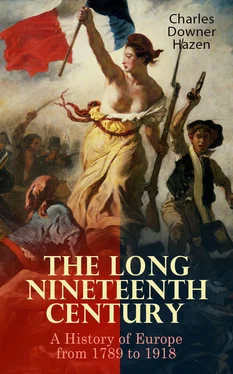Voltaire was not primarily a political thinker. He attacked individual abuses in the state and he undermined the respect for authority, but he evidently was satisfied with monarchy as an institution. His ideal of government was a benevolent despotism. He was not a democrat. He would rather be ruled by one lion than by a hundred rats, was the way in which he expressed his preference.
The Church was his bete noire, as he considered it the gloomy fastness of moldering superstitions, the enemy of freedom of thought, the persecutor of innocent men who differed from it, as the seat of intolerance, as the supporter of all kinds of narrow and bigoted prejudices. Voltaire was not an atheist. He believed in God, but he did not believe in the Christian or in the Hebrew God, and he hated the Roman Catholic Church and all its works and dealt it many redoubtable blows. In eighteenth-century France the Church, as we have seen, presented plenty of vulnerable sides for his fiery shafts. Voltaire's work was not constructive but destructive. His religious faith was vague at best and not very vital. He scorned all formal creeds.
Very different in tone and tendency was the work of another author, Jean Jacques Rousseau (1712-1778). In Voltaire we have the dry, white light of reason thrown upon the dark places of the world. In Rousseau we have reason, or rather logic, suffused and powerfully refracted with emotion. If the former was primarily engaged in the attempt to destroy, the latter was constructive, imaginative, prophetic. Rousseau was the creator of an entire political system; he was the confident theorist of a new organization of society. Montesquieu and Voltaire desired political reforms in the interest of individual liberty, desired the end of tyranny. But Rousseau swept far beyond them, wishing a total reorganization of society, because no amount of patching and renovating could make the present system tolerable, because nothing less would render liberty possible. He wrote a magic prose, rich, sonorous, full of melancholy, full of color, of musical cadences, of solemn and pensive eloquence. The past had no power over him; he lacked completely the historical sense. The past, indeed, he despised. It was to him the enemy par excellence, the cause of all the multiplied ills from which humanity was suffering and must free itself. Angry with the world as it was - his own life had been hard -he, the son of a Genevan watchmaker, had wandered here and there practising different trades, valet, music-teacher, tutor - he had known misery and had no personal reason for thinking well of the world and its boasted civilization. In his first work he propounded his fundamental thesis that man, naturally good and just and happy, had been corrupted and degraded by the very thing he called civilization. Therefore sweep civilization aside, and on the ground freed from its artificial and baneful conventions and institutions erect the idyllic state.
Rousseau's principal work was his Social Contract, one of the most famous and in its results one of the most influential books ever written. Opening with the startling statement that "man was born free and is everywhere in chains," he proceeded to outline, by pure abstract reasoning, and with a lofty disregard of all that history had to teach and all that psychology revealed of the nature of the human mind, a purely ideal state, which was in complete contrast to the one in which he lived. Society rests only upon an agreement of the persons who compose it. The people are sovereign, not any individual, nor any class. All men are free and equal. The purpose of any government should be to preserve the rights of each. Rousseau did not at all agree with Montesquieu, whose praise of the English form of government as insuring personal liberty he considered fallacious. "The English think themselves free," he said, "but they are mistaken, for they are free only at the moment in which they elect the members of Parliament." As soon as these are chosen, the people are slaves, they are nothing, since the members of Parliament are rulers, not the people. Only when the next election comes round will they be free again, and then only for another moment. Rousseau repudiated the representative system of government and demanded that the people make the laws themselves directly. Government must be government by majorities. The majority may make mistakes, nevertheless it is always right. Rousseau's state made no provision for safeguarding any rights of the minority which the majority might wish to infringe. The harmful feature of his system was that it rendered possible a tyranny by a majority over a minority quite as complete and odious and unrestrained as any tyranny of a king could be. But two of his ideas stood out in high relief -the sovereignty of the people and the political equality of all citizens, two democratic principles which were utterly subversive of the states of Europe as then constituted. These principles powerfully influenced the course of the Revolution and have been preached with fervor and denounced with passion by rival camps ever since. They have made notable progress in the world since Rousseau gave them thrilling utterance, but they have still much ground to traverse before they gain the field, before the reign of democracy everywhere prevails.
There were many other writers who, by attacking this abuse and that, contributed powerfully to the discrediting, the sapping of the Old Regime. A conspicuous group of them busied themselves with economic studies and theories, enunciating principles which, if applied, would revolutionize the industrial and commercial life of the nation by sweeping away the numerous and formidable restrictions which hampered it and which permeated it with favoritism and privilege, and by introducing the maximum of liberty in commerce, in industry, in agriculture, just as the writers whom we have described enunciated principles which would revolutionize France politically and socially.
All this seed fell upon fruitful soil. Remarkable was to be the harvest as we shall shortly see.
The Revolution was not caused by the philosophers, but by the conditions and evils of the national life and by the mistakes of the government. Nevertheless these writers were a factor in the Revolution, for they educated a group of leaders, instilled into them certain decisive doctrines, furnished them with phrases, formulas, and arguments, gave a certain tone and cast to their minds, imparted to them certain powerful illusions, encouraged an excessive hopefulness which was characteristic of the movement. They did not cause the Revolution, but they exposed the causes brilliantly, focused attention upon them, compelled discussion, and aroused passion.
Chapter III
Beginnings of the Revolution
Table of Contents
Under Louis XVI the financial situation of France became more and more serious, until it could no longer be ignored. The cost of the participation in the American Revolution, added to the enormous debt inherited from the reigns of Louis XIV and Louis XV and to the excessive and unregulated expenditures of the state and the wastefulness of the court, completed the derangement of the national finances and foreshadowed bankruptcy. In the end this crisis forced the monarch to make an appeal to the people by summoning their representatives.
But before taking so grave a step, the consequences of which were incalculable, the government tried various expedients less drastic, which, however, for various reasons, failed. Louis XVI was the unhappy monarch under whom these long accumulating ills culminated. The last of the rulers of the Old Regime, his reign covered the years from 1774 to 1792. It falls into three periods, a brief one of attempted reform (1774-1776) and then a relapse for the next twelve years into the traditional methods of the Bourbon monarchy, and after that the hurricane.
Читать дальше












